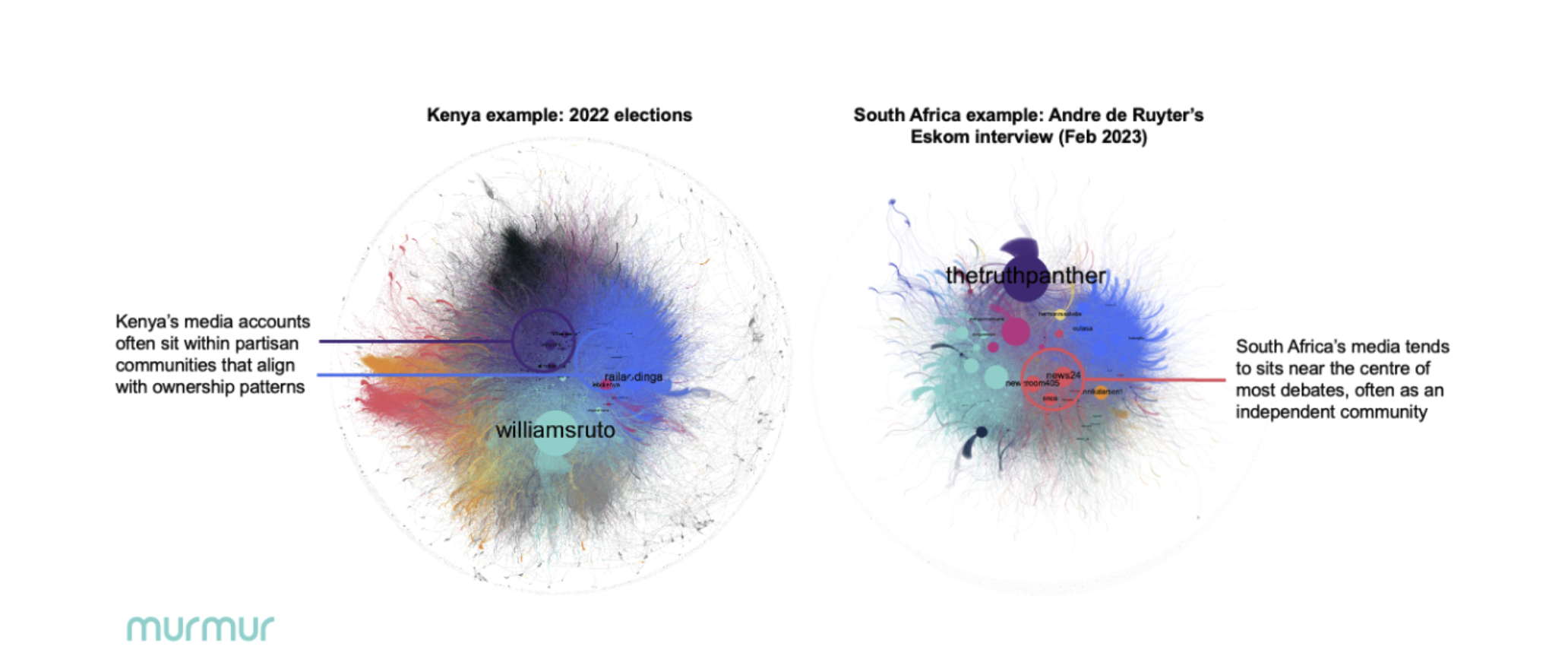SOCIETAL MEASURES OP-ED
Unraveling the critical influence of media ecosystems on South Africa’s national narratives

A country’s social media discourse often mirrors that country’s (or industry, issue or organisation's) real-world dialogues, which helps us understand the ‘health’ of those discussions.
By analysing social media, it is possible to gain insights into the overall media landscape of a country — the level of partisanship, impact of media ownership, adherence to agreed standards, and consensus around ‘facts’. These factors are pivotal in determining whether healthy, good-faith debate can thrive.
Each country presents unique dynamics in its media ecosystem. In the US, the chasm between Democrats and Republicans creates parallel universes where each side debates stereotyped caricatures of the other. In Indonesia, political discourse on social media is seen as a form of theatre, influenced by ‘buzzer’ culture. Meanwhile, Egypt’s authoritarian government stifles debate, only promoting sweetheart, softball pro-government narratives.
Through our work, we’re starting to unravel what these structures look like across Africa. One scenario is the hyper-partisan, US model where, through the industrial-scale leveraging of influence networks, political discourse becomes fragmented into isolated echo chambers. Another scenario reflects a modern version of the traditional 8 o’clock news, where all walks of life gathered around the proverbial living room television to get the same facts. A third scenario is the complete stifling of debate, as we have seen in openly authoritarian states.
The Kenyan and South African media ecosystems give us good examples of the first two scenarios at various stages of evolution.
We recently supported the Institute of Security Studies in measuring the 2022 Kenyan National Elections on social media. The project revealed more than just instances of disinformation and fake news. The real insights related to the structure of Kenya’s media landscape and how it shapes national debates. Despite identifying instances of ‘fake news’, such as a widely shared false report about a leopard meant to suppress voter turnout, these were minor compared to how the overarching structure of the media ecosystem — both traditional and social media — shaped the narratives around the elections.
Fake Press Release on Leopard sighting in Murang’a County.
In case of any wildlife incidences call us on our toll free number 0800 597 000 or our WhatsApp number +254726610509 for immediate intervention. pic.twitter.com/kPlqqNSxXh
— Kenya Wildlife Service (@KWSKenya) August 8, 2022
In Kenya, the political discourse is bifurcated between incumbents and challengers (these roles sometimes reverse between elections, but the same entrenched players persist, even if they try to convince us of their every-man, underdog status à la Donald Trump). Their landscape is reminiscent of American media partisanship, though not as advanced in its polarisation. Influential “social media experts”, hired by both presidential candidates, leveraged their networks of influence to create echo chambers of hyper-partisan support for their patron. Media houses whose owners were aligned with one candidate’s camp or the other became key sources of news for each echo chamber. The result was a moderately fragmented, partisan media ecosystem where media sat within one partisan echo chamber or another.
This scenario contrasts starkly with South Africa’s relatively healthy media ecosystem. Despite its challenges, South Africa maintains a free, independent media that creates its own community separate from any partisan group — a seeming rarity in the world these days. Attempts to polarise the media, such as those made by the Jacob Zuma-sponsored and Gupta-owned, ANN7 and The New Age during the State Capture era, and more recently with Iqbal Survé’s China-backed, Independent Media, have been largely resisted. This systemic resilience is crucial for sustaining South Africa’s democratic integrity, as political actors — despite differing interpretations — agree on basic facts.

Figure 2: This chart highlights the differing positions of media accounts in Kenyan versus South African X/Twitter conversations. Examples used include Kenya’s 2022 National Elections and conversations around Andre de Ruyter’s Feb 2023 interview with Annika Larsen. (Graphic: Supplied)
Our analysis underscores the significance of media ecosystems in shaping a country’s political dynamics. A healthy political environment relies on tough debates grounded in shared facts, facilitated by a central, independent media. The erosion of this trust, often by cynical or malevolent forces, risks undermining democratic faith. Polarisation fosters simplistic, populist narratives, paving the way for extreme, authoritarian ideologies. Shoring up an independent, respected Fourth Estate guards against this. DM
Kyle Findlay is the co-founder of Murmur, a data-driven consultancy that uses big data and AI to track and analyse socio-political topics. They provide their clients with a bird’s eye view of countries’, industries’ and organisations’ information landscapes, and the roles that influence campaigns, media, politics and social dynamics play in shaping them. Website: www.murmurintelligence.com




















 Become an Insider
Become an Insider
Comments - Please login in order to comment.